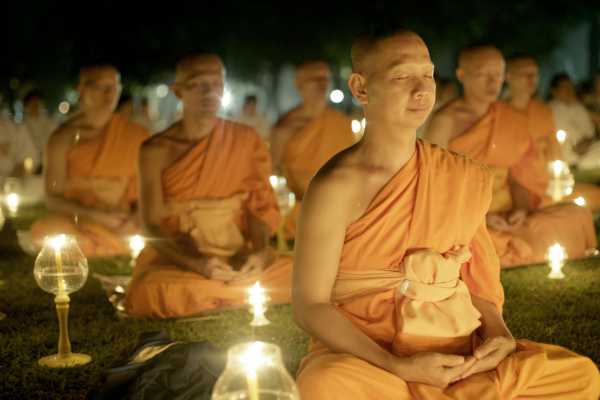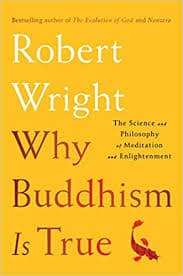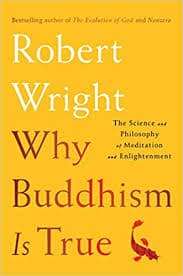
Robert Wright, the best-selling author of The Moral Animal and The Evolution of God, has written a new book titled Why Buddhism is True. Don’t be put off by the audacious title, though.
Wright isn’t proselytizing or implying that other religions are false. This is, instead, a light, accessible guide for anyone interested in the practical benefits of meditation. There are no analyses of Buddhist beliefs about reincarnation or supernatural deities; the focus is on what Wright calls Western Buddhism or secular Buddhism, which is less about belief and more about meditation as a therapeutic practice.
By “true” Wright means that Buddhism’s “diagnosis of the human predicament is fundamentally correct, and that its prescription is deeply valid and urgently important.” That diagnosis goes something like this: the human condition is defined by constant and ultimately inexplicable suffering. Meditation isn’t a way out of this suffering. But it helps us transcend it by teaching us to see it clearly for what it is, and by making us more attuned to our emotive impulses and the behaviors they produce.
I sat down with Wright at the Vox office in Washington, D.C. We talked about the illusion of self, the psychology of tribalism, how meditation can make us more moral, and why he thinks spreading meditation practice could be socially transformative.
“One of the things that’s most lacking in the world is not emotional empathy, it’s cognitive empathy,” he told me, “meaning we have trouble seeing things from the point of view of other people … That is more urgently needed than emotional empathy.”
Wright believes meditation, if not quite a solution to this problem, is at least a corrective. By training us to focus our attention on the present moment, to the breath and the body, we can start to see most of our thoughts as petty and our emotions as fleeting. Through this practice, the self starts to dissolve and we can be more aware of other people, and build something like a broader consciousness.
Part of the problem is that our busy minds distract us from immediate experience; we’re too absorbed in our thoughts to be truly present. We’re also stuck with brains that evolved under very different circumstances than we confront today.
We’re hard-wired to pursue pleasure, and that leaves us perpetually unsatisfied. What we have is never quite enough, and so our attention is always directed at the future, at what we think we want. “We’re not designed by natural selection to be happy,” Wright says.
Meditation isn’t the only path to peace, but it might be the simplest and best one.
You can read a lightly edited transcript of our conversation below or click on the link to listen to it in full.
Sean Illing
So your book has a slightly obnoxious title. It’s going to strike a lot of people as implying that Buddhism is true and therefore other religions are false. Is that fair?
Robert Wright
It does sound like I’m coming down from the mountaintop with this revealed truth and I’m going to kindly take some time to share it with mortals. But as for the other religions problem, I’m only talking about what you could call the naturalistic parts of Buddhism, so I’m not talking about reincarnation, the supernatural stuff. I’m talking about the claims that you might say are made by Buddhist psychology and philosophy.
There’s no real contradiction between this and any religions. The Dalai Lama doesn’t use Buddhism necessarily. Remember, Buddhist use it to become a better whatever you are. I think if you’re talking about Buddhism in larger sense to include the supernatural stuff, I’m not sure that you can defend that claim but I think if you’re just talking about what is sometimes called, misleadingly I think, the secular part of Buddhism or the naturalistic part, there’s no reason for anyone to feel threatened by me.
Sean Illing
What do you mean by “naturalistic”?
Robert Wright
The part of Buddhism that I’m defending is the claim that the reason we suffer is because we don’t see the world clearly, and that that’s also the reason we make other people suffer. In other words, it’s the reason we’re often not happy and it’s the reason we’re often not good is that we are subject to illusions about ourselves, about the world, and if we could only clarify our vision, then we’d be happier and better people.
It’s an amazing claim because the idea there is that you can kill three birds with one stone in principle, and Buddhism provides the stone. It provides a path of practice and, in some sense, education that according to Buddhism at least does help you see things more clearly, does make you happier, and does make you a better person.
I’m actually defending the idea, certainly that we, by our nature, tend not to see the world clearly in a lot of consequential respects, that that does often make us unhappy. It does often make us behave badly toward other people and in addition to buying this diagnosis of the human predicament, I think there’s quite a lot to be said for the prescription.
I myself have gotten fairly seriously into mindfulness meditation, and I practice it in the context of Buddhist philosophy. I’ve been on retreats, one week, two week retreats, a number of these, partly just to get a sense for what I would like to be like, a super committed meditator, which I’m not. I have a daily practice but I’m not one of these highly adept meditators.
Sean Illing
Well, let’s dive into the meditation mindfulness part of this because your book starts with you recounting the experience of being at a retreat and feeling as though you finally woke up, like Neo in “The Matrix” taking the red pill. What happened? What was the experience like at that retreat, and how was it transformative for you?
Robert Wright
My first retreat was back in 2003, and I had never had any success in meditating. I have like a really limited attention span. I’m fidgety. I’m not a picture of emotional stability, I would say, so I was not a natural meditator. It had never really clicked. Somebody suggested I go to a retreat. I went to one week silent meditation retreat, which is very closely associated with mindfulness meditation, although they’re not the same thing, and it was amazing. The first two days were hell. I couldn’t focus on my breaths for 10 consecutive breaths, but I eventually had pretty memorable experiences and beyond that, beyond the experiences I had meditating, which included some pretty powerful experiences, there was just an ongoing transformation of my consciousness.
So by the end of the week, I felt like I was a different person. I remember I called my wife after the retreat and before I had even said anything, when she just heard the tone of my voice, she said she liked the new me. It was.
Before I elaborate, I should issue the warning that these effects may not last forever if you go on a meditation retreat. It’s not that easy to sustain the frame of mind you’re in, but I just had a hugely deepened appreciation of beauty. I’m normally not that aesthetically sensitive, I guess. I was much less judgmental of people. Before, it’s funny, before meditation before the retreat, you’re looking at people and you’re just sizing them up while you do. You’re going like, “Oh. Well, that’s an asshole. That’s an asshole. He looks okay.” It’s like, maybe not everyone does that anyway. I do that.
I have gotten enough of a taste of it that I can see the logic of how it works, how a daily practice can make you a little happier, a little better, and how in principle really intensive meditation could be transformative. Now, whether that could bring true full-fledged enlightenment is another question, where you are completely liberated from suffering and you have a completely clear view of the world and so on. That’s the Buddhist ideal, but certainly I think you can go a ways down that path, and I’m sure that I could go a lot further than I have if I had the time to commit to it.
Sean Illing
I have tried meditating regularly probably a half a dozen times, and I’m just completely inept at it. I just cannot do it with any regularity. I don’t think most people understand how difficult it is to sit still and pay attention to your moment-to-moment experience.
In the book, you talk about how we’re walking around with this outdated operating software for our brain that was designed or fitted for a very different kind of life circumstance that has almost nothing in common with present reality. This disjunction results in a lot of neuroses and pathologies and psychological disorders. So how does meditation ameliorate that or make our day-to-day mental life better?
Robert Wright
Let me first say that the problem is actually even worse than that. That is a problem that we’re not living in the environment that we were designed for. We’re put in situations like I’ve got to give a talk tonight. I’m going to address a roomful of people I’ve never met. We weren’t designed to do that. There are a lot of things that cause anxiety that just we were not designed to do and that’s why they cause such anxiety. That said, when I say the problem is even worse than that, it’s that we weren’t designed by natural selection to even be enduringly happy in the environment that we were designed for, like a hunter gatherer environment.
In fact, the two, as you’ve said, I’ve written about evolutionary psychology, I wrote a book called The Moral Animal a long time ago, and one thing I emphasize in that book is that we’re clearly not designed to be happy, and we’re not designed to see the world clearly. Natural selection just wants to get genes into the next generation. I say “wants to” and personifying natural selection, obviously it’s not really a conscious process, but if you look at its priorities, it’s designing organisms that get genes into the next generation. If illusions will help them do that, then illusions there will be. If suffering will help them do that, then suffering there will be.
That’s why things like anxiety, fear, unpleasant feelings are natural to begin with and even exaggerated anxieties and fears. In other words, fearing things more often than it’s going to turn out to be warranted. All that is natural, but then you put us in a modern environment and things get even worse. You’re right, we’re kind of doubly cursed.
Sean Illing
So how does Buddhism, or I guess more particularly, how does the practice of meditation make that better?
Robert Wright
Well, one implicit assumption of mindfulness meditation is that it makes sense to be suspicious of our feelings. In a certain sense, in a way that’s a big part of Buddhism that all of the things going on in your head are not necessarily to be taken very seriously. Again, evolutionary psychology I think drives that point home and explains why a lot of these feelings are not to be trusted.
Meditation is a discipline that helps you not take them seriously and that liberates you from the tyranny of feelings. It’s a technique for taking things ranging from anxiety to remorse to actual physical pain and they’re taking a perspective on them that somewhat releases you from their grip.
So it’s just a technique for doing what both Buddhist philosophy says is well-advised and what, in a certain sense to me, evolutionary psychology says is well-advised, which is don’t take your feelings too seriously, especially certain feelings which are manifestly misleading, which manifestly cloud your vision and keep you from seeing the world clearly.
Sean Illing
You talk a lot about tribalism in the book, and I’d love to connect that to this idea of the self. I’m utterly convinced that the self is an illusion, albeit a very powerful one. I think we labor under the illusion that there is a thinker behind our thoughts or a doer behind our deeds when, in fact, I think we’re just a field of consciousness responding to things in the world. One of the reasons why a lot of people like meditating, and one of the reasons why a lot of people are attracted to Buddhism, is because they think it’s a path to the dissolution of the self or to cutting through that illusion, and the idea that that will make you somehow a better person and more engaged with other people and with the world around you. Is that what you believe?
Robert Wright
Well, Buddhism claims that we are subject to illusions and one of the main illusions Buddhism emphasizes is what they call the illusion of self. The other big illusion I talk about in the book is the illusion of projecting essence onto things, imaging that there’ some ultimate meaning or purpose. According to Buddhism, the proper view is to not project essences onto things.
I had an experience on my first retreat where I was walking through the woods and I saw a weed that I had really spent a lot of time trying to extract from my yard, and all of a sudden I didn’t understand why I had done that because it didn’t have essence of weed. It looked as beautiful as everything else and I was really just baffled like, “Why am I doing that?”
As for self, that can mean different things and I probably focus more in the book on the meanings of not-self in Buddhism that are particularly well-corroborated by modern psychology, but certainly one of them is the one that I think you alluded to, the idea that the conscious self is really the CEO, that it’s like the doer of deeds. It’s the thinker of thoughts. You are really in charge consciously. There’s a fair amount of evidence in recent psychology that that’s not the case. There are these studies that seem to show that if you ask experimental subjects to push a button whenever the want to, it turns out that the motor activity initiating that actions precedes the person’s conscious decision to do so. There’s a lot evidence like this, and certainly the reports of really advanced meditators is that, “Yeah, I just realized I thought I was in charge. It was an illusion. It wasn’t doing me any good. Things still work fine. I just watch it happen. They seem very relaxed.
I’ve had these experiences. They’re not always easy. I am not completely liberated from anxiety by any means, but I’ve had the experiences and this is another path to a form of not-self in Buddhism, which is a kind of incremental approach. You identify less and less with emotions and with thoughts. If you start doing that with all of the elements of your interior experience, then pretty soon the sense of self is not anything like what it used to be if you’re not identifying with any of that stuff.
Sean Illing
I don’t want to tumble too far into the weeds and lose people, but this question of whether or not the self is real seems to me to have pretty profound implications for how we live. The difference between saying, “I have a body” and “I am a body” is vast and has ethical implications. A lot of what you write has to do with morality and how we can become better people. What’s the connection between mindfulness meditation and becoming more moral? Does one lead to the other?
Robert Wright
I think so. The superficial version of that is just that being stressed out tends to make you behave like a jerk. If you look at times when you’ve been rude to a checkout clerk or somebody, you were probably a little stressed out or something, so there’s that. If you just think of mindfulness in a strictly therapeutic sense, like mindfulness-based stress reduction, it’s probably going to make you a little easier to get along with.
I think the more you go down the path, the clearer the connection between practice and your everyday moral behavior. As I said, all the way down the path is this idea of emptiness where you’re not projecting essences onto lamps or weeds or people, but if you just get a little ways down the path and are reacting a little less emotionally to people, you can make real progress. Can I talk about a cognitive bias that fascinates me because it’s so subtle?
Sean Illing
Sure.
Robert Wright
This is an example of what used to be called the fundamental attribution error. The idea was that we tend to, when we analyze people’s behavior, we attribute too much to their disposition and not enough to their situation. So we see somebody being a jerk at the checkout counter and we go, “Oh, he’s a jerk,” whereas in fact, he might’ve just had a bad day. He might’ve just found out he has cancer. Who knows, but the default thing tends to be, “That’s the kind of person they are,” whereas if you see somebody giving money to a homeless person, “Oh, that’s a good charitable person.”
Now, it turns out it’s more complicated than that, and here’s the way it actually works, which is that with our friends and allies, if they do something good, we attribute it to disposition. We at least tend to, and not to circumstance. If our friends and allies do something bad, if they misbehave, then we attribute it to circumstance, “They were low on sleep. They were, peer group pressure,” whatever. With our enemies, if they do something bad, we go, “Yeah, that’s the kind of person they are. No surprise.” That is essence of them. If they do something good, we explain it away, “Oh, he’s showing off in front of some woman or something,” and this is a deeply consequential fact, and it’s very, very subtle.
I think it’s one reason when people want to go to war. They spend so much time demonizing the leader of the country they want to invade because once he’s in that box, once everybody’s thinking of him as the enemy, as a bad guy, there’s nothing he can do to escape. Anything good he does, people will take as not representative of him and as just some kind of trick and anything bad he does will be taken as confirmation. I personally think you saw this in the run-up to the Iraq war, not that Saddam Hussein wasn’t a genuinely bad guy, but I think like the Hitler comparisons had the effect of deeply influencing the way we process information about him. I think this has consequences on the scale of wars, whether they happen or not, but they also have consequence in everyday life.
If you look at people you consider rivals and enemies and think about it, and think about how you process their behavior, you’ll find that you’re doing this. I know because I do it.
Sean Illing
This is why I’m always harping on the self as an illusion. It’s a story that we tell ourselves. It’s a way for us to narrativize our experience and give ourselves some kind of agency. We do this with everything. We tell stories about experience in order to give it some sort of cohesion or to make it internally coherent, or whatever the case may be. Any practice or any activity that helps you dissolve those stories and to cut through them and to just be more in contact with immediate experience, I think that makes you more empathic and maybe less prone to being a jerk.
Robert Wright
For somebody who claims they’ve never successfully meditated, you sound pretty close to enlightenment.
Sean Illing
Well it’s always easier to say the right words. Part of my personal frustration is that I’ve thought about these things, I think I understand them, and yet I still fail time and again to translate what I know into what I do. Knowing and doing are very different things.
Robert Wright
They are. This is what attracted me. After I wrote my book on evolutionary psychology, I was more aware than ever of the absurdity of being human. We have all these feelings that distort our vision that are unpleasant. We make these judgments about people that are self-centered. That was a big theme in the book, and yet I felt worse than before. I was more aware of all the unfortunate things about me. Buddhism isn’t a panacea, but it does offer a prescription.
Sean Illing
Let’s try to put a bow on this conversation by connecting it with something that feels concrete and urgent. You alluded to it a minute ago when you spoke about tribalism. We are deep sunk in a very tribalized climate where people are not talking to each other, are certainly not listening to each other across the aisle. I’m not sure you say this in your book explicitly, but do you think that if we were all meditating, or at least trying to be more mindful and to practice meditation regularly, that that would be socially and politically transformative?
Robert Wright
Absolutely. I just started this thing called mindful resistance. It’s at mindfulresistance.net, and the idea isn’t that if we all meditate everything will magically get better. In fact, the idea isn’t even that you have to meditate to sign on to what I’m basically talking about. It’s enough if you just try to be mindful in the plain English sense of that word — just being aware, attentive, alive to other people.
Buddhism is very anti-essentialism and essentialism includes seeing essence of groups, which is what racism is. If you view all Trump supporters as bigots or idiots, I think that’s a big mistake. Even if it were true that they were all racists, I would want to know how they became racist. I don’t think people are born like that. I would want to know what circumstances made them like that. There’s so many things that seem worthy of outrage, in my view at least, that are happening that it’s hard to know when maybe you’re going too far.
I think it’s always a useful exercise to try to understand how people are reacting to the world, what made them the way they are, and I think that is, in a way, more urgently needed than emotional empathy.



Sourse: vox.com






